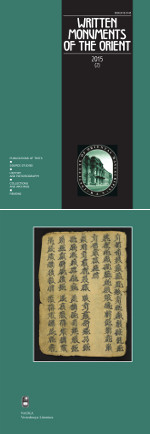|
|
| |

|

|
Sabrukova S. Examples of Buddhist Letters from A.M. Pozdneev Archive Collection // Written Monuments of the Orient, 2. Moscow: Vostochnaya literatura, 2015. P. 77-84.
Buddhist letters represent official documents that were issued by the Dalai
Lamas and Panchen Lamas to prominent political or religious figures as a sign of
recognition of their achievements. They appeared at the end of the 16th c. when
Buddhism was recognized as a state religion among Mongolian peoples. Three copies of
such letters have been kept in the A.M. Pozdneev (1851–1920) collection in the Archives
of the Orientalists at the Institute of Oriental Manuscripts, RAS. The earliest letter,
which was written in Tibetan semi-uncial script and included a translation in the Oirat
language, was given by the 5th Panchen Lama (Lobsang ye shes dpal bzang, 1663–1773)
to a Torghut Yogochari Tsordji. Two other scrolls were written only in Tibetan semiuncial
script and were given by the 13th Dalai Lama (1876–1933) and the 9th Panchen
Lama (1883–1937) in 1903 to a Dörbet Lama Ngag dbang sangs rgyas. From a practical
point of view, these letters can be seen as certificates of completed education and
obtaining a title that enabled the holder to engage in teaching activities. Their language
and style have a formal structure and are of scholarly interest to researchers as examples
of Buddhist documents. PDF-файлы PDF-файлы
Полный текст статьи
Ключевые слова
далай-ламы
панчен-ламы
письма буддийские
рукописи тибетские
|
|
|
|
Случайная новость: Объявления |
|
ВНИМАНИЕ читателям Библиотеки ИВР РАН! C 3 февраля по 4 марта 2025 г. проводится перерегистрация читателей. |
|
Подробнее...
|
|
|
|
|

